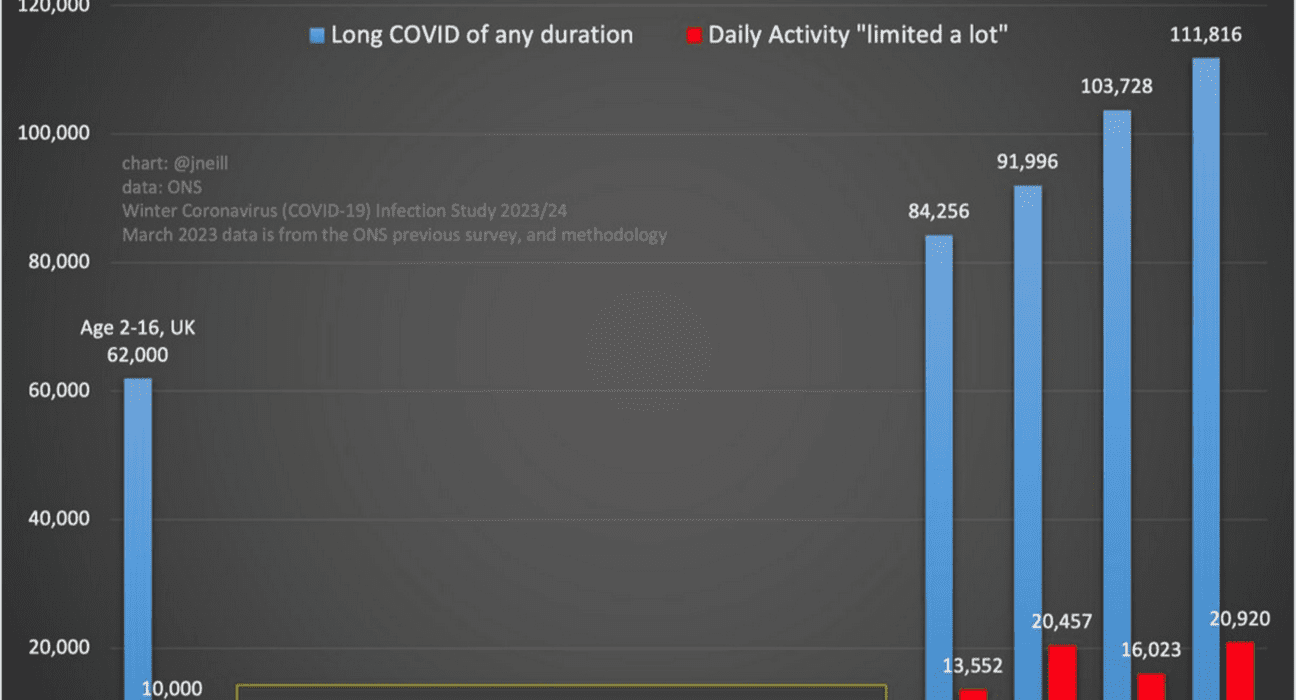SOURCE: Liew, F., Efstathiou, C., Fontanella, S. et al. Large-scale phenotyping of patients with long COVID post-hospitalization reveals mechanistic subtypes of disease. Nat Immunol 25, 607–621 (2024).
Summary:
The study by Evans et al. aimed to characterize the clinical features and inflammatory profiles of long COVID patients in the UK and their association with one-year recovery post-hospitalization. Through immune profiling, distinguishing features of long COVID were identified, highlighting the importance of considering subphenotypes in patient management and the potential for antiviral or immunomodulatory therapies in controlled trials. The study emphasized the need for further research to validate findings in larger cohorts and explore the representativeness of hospitalized cases.
Study Focus 1: Investigated inflammatory markers in long COVID subgroups.
- Findings:
- Myeloid inflammation and complement activation present in cardioresp, fatigue, anxiety/depression, cognitive, and GI groups.
- Elevated SARS-CoV-2-specific antibody levels in long COVID.
- Limitations: Small effect sizes, need for validation in larger studies, and representativeness of hospitalized cases.
This study sheds light on the inflammatory pathways underlying different long COVID subgroups, providing insights into potential mechanisms and biomarkers for further research.
The second study aimed to explore the protein markers associated with different long COVID symptoms. The research revealed that the persistence of SARS-CoV-2 antigens did not show significant relevance to long COVID. Instead, the analysis highlighted a correlation between inflammation and specific tissues in distinct symptom groups. Moreover, gender variations were observed in the associations between symptoms. Statistical methods were employed to identify significant protein markers, shedding light on the tissue-specific inflammation linked to various long COVID symptoms. The findings suggest the importance of considering subphenotypes when managing patients with long COVID and support the potential use of antiviral or immunomodulatory agents in controlled therapeutic trials. The study’s data and materials are available online under a CC BY 4.0 license, providing valuable insights into the molecular mechanisms underlying long COVID symptoms and offering a basis for further research in this area. This research contributes to the growing body of knowledge on long COVID, emphasizing the need for personalized approaches in treatment and the potential for targeted interventions based on the identified protein markers associated with specific symptoms. The study’s comprehensive analysis of protein markers and their tissue-specific implications provides a foundation for future investigations into the pathophysiology of long COVID and the development of tailored therapeutic strategies to address the diverse manifestations of this condition.
- Study Focus 2: Investigated proteins associated with different long COVID symptoms.
- Findings:
- SARS-CoV-2 antigen persistence not significant in long COVID.
- Inflammation linked to specific tissues in different symptom groups.
- Gender differences in symptom correlations observed.
- Data Analysis:
- Utilized statistical methods to identify significant protein markers.
- Demonstrated tissue-specific inflammation in various long COVID symptoms.
- Data Availability: Open access under CC BY 4.0 license with study materials available online.
For more details, access the full article at .
Main Points:
Study Focus 1
- Characterization of clinical features and inflammatory profiles in long COVID patients.
- Identification of distinguishing features through immune profiling.
- Association between inflammation profiles and one-year recovery post-hospitalization.
- Importance of considering subphenotypes in managing long COVID patients.
- Potential for antiviral or immunomodulatory therapies in controlled trials.
The study underscores the significance of immune profiling in identifying distinguishing features of long COVID and highlights the potential for targeted therapies in managing this complex condition.
Long Covid The Answers
Study focus 2
- Study Focus: Investigated proteins associated with different long COVID symptoms.
- Findings:
- SARS-CoV-2 antigen persistence not significant in long COVID.
- Inflammation linked to specific tissues in different symptom groups.
- Gender differences in symptom correlations observed.
- Data Analysis:
- Utilized statistical methods to identify significant protein markers.
- Demonstrated tissue-specific inflammation in various long COVID symptoms.
- Data Availability: Open access under CC BY 4.0 license with study materials available online.
Credible Source:








